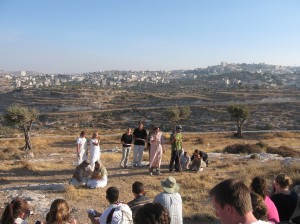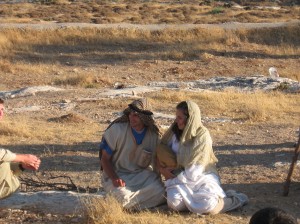I've been pondering about respect for YEARS! Like in my previous post, I realized that my family had something that that wasn't exactly common, so I wanted to figure out how it happened. The thing is, I'm the 5th kid of 6...so the atmosphere of my family was definitely already established before I was born. I didn't get to see how my parents started it, and I knew that I wanted to cultivate similar respect in my future family and wanted to understand how it was created. I thought about it, though, and I came up with a few things my parents did to establish an atmosphere of respect. Then I want to talk about another family's example of respect, and then finish with respect in my classroom.
Here are things my parents do that I think contributes to the high-respect level in my family:
1. They show respect for each other at all times (literally, I don't think I have ever seen them disrespect each other)
2. If they ever do/say something that hurts our feelings, they apologize to us (I don't know if you've ever had one of your parents apologize to you, but it's a humbling, gratifying experience that definitely built my respect for them)
3. They demand that we show respect for each of them. Pretty much the worst thing you could do in our family is disrespect one of our parents, in which case, the other parent would come and have a serious talk with you, and you would never want to do it ever again. At least, I didn't.
4. They each express appreciation for the other to us, when the other one isn't there. I can't count the times that Mom, when Dad wasn't there, told us how much she loves Dad and how grateful she is for everything he is and does. Dad does the same, talking about Mom to us. This is reassuring as a child, and it also built our respect for them.
5. It's just the unspoken expectation that everyone knows. I can't imagine back-talking my parents or speaking to them with an attitude; I really can't. It would be such a cultural faux-paux.
So figuring out those things helped me get an idea of how an atmosphere of respect was created, at least in one situation. Then I found another family that has a high amount of respect for each other. It's the family of one of my Relief Society ladies back home. She's 30-something and has 3 kids. And I was struck by how much respect she has for her kids! In turn, they respect her and each other, and the family has an easy, comfortable feel to it. I asked her about it once. She said that she shows her kids respect. I asked her how, and she said something that I consider to be profound. She said, "Mostly by listening to them." That's it! It seemed too simple, so I watched her, and I noticed that when her 2 year old daughter wanted her to see/watch something or listen to her, my friend gave her her full attention. She zoomed in on that baby when many mothers would be like "yeah, uh huh, that's cool." But even at that young age, she showed her baby the respect that if she (the baby) thought it was important, she (the mother) would esteem it as important. Kind of like a certain other Being I know and admire... :)
Finally I have had the opportunity to practice what I've learned. Three months ago I started teaching 5th grade. I thought a lot about the kind of atmosphere I wanted to create, and I had an idea of how to create it, but not really. So I did the best I could, and the first weeks were a whirlwind, and now I'm finally at a place where I have time to reflect. When I've been observed by the higher-ups, the first thing they always say is, "I like the feeling-tone in your classroom" or "I love the atmosphere you've created." Something to that effect. So I thought about it, and I think I've been largely successful in accomplishing what I wanted to in that area (I say this not to brag, but to figure out how it happened). My students respect me, I respect them, and they are generally kind to each other. Our classroom feels peaceful, calm, and relaxed. We work, we laugh, we play. It's just good. So I have been thinking about what I did that made it that way (and I believe that I am only responsible for half of this result...the other half came from the students themselves). Here's what I came up with:
1. Four out of our 5 class rules have to do with respect: Show RESPECT for yourself, Show RESPECT for your peers, Show RESPECT for your teacher, and Show RESPECT for the school.
2. I do my best to show respect for them. I pay attention to them when they talk, when I'm helping a child I am completely focused on him/her, I try not to call them out or embarrass them, and I respect their ideas. I try really hard to incorporate democracy into our classroom, letting them voice their ideas and concerns and then voting on what we should do about them. They know that I care about their ideas. For example, although I presented the class rules, they came up with the consequences themselves. At least once a week, a student will bring something up and we will vote on it as a class. It is not a dictatorship. I try be authoritative but not authoritarian. They have say in how our classroom runs.
3. I require them to show respect to each other. If a student is making a comment and others are talking at the same time, I tell the student to wait until his classmates are showing him respect. And I use the word respect. I try to encourage kindness by keeping a bucket where students write the kindnesses that their peers are showing them, and we read the papers aloud at our class meetings.
4. If we have an issue, we discuss it. The other week I was noticing a few hurtful comments being exchanged by members of our class, and I brought it up at our class meeting. We discussed it and resolved to do better.
5. My students know that what makes me most proud is to hear that my students are kind and respectful when I'm not there; what makes me most disappointed is when they are disrespectful.
So I feel like I'm more prepared to create an atmosphere of respect in my future family, recognizing the contributing factors in the three situations above. And I think that the bottom line is this: to get respect you have to show it.
What do you think? Are there other factors that you've noticed? How do YOU establish respect?


